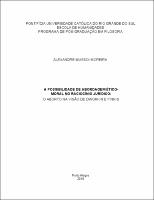| Share record |


|
Please use this identifier to cite or link to this item:
https://tede2.pucrs.br/tede2/handle/tede/7109Full metadata record
| DC Field | Value | Language |
|---|---|---|
| dc.creator | Moreira, Alexandre Mussoi | - |
| dc.creator.Lattes | http://buscatextual.cnpq.br/buscatextual/visualizacv.do?id=K4778738A3 | por |
| dc.contributor.advisor1 | Souza, Draiton Gonzaga de | - |
| dc.contributor.advisor1Lattes | http://buscatextual.cnpq.br/buscatextual/visualizacv.do?id=K4723271P1 | por |
| dc.date.accessioned | 2016-12-26T16:39:47Z | - |
| dc.date.issued | 2016-10-24 | - |
| dc.identifier.uri | http://tede2.pucrs.br/tede2/handle/tede/7109 | - |
| dc.description.resumo | O presente trabalho busca determinar a possibilidade de abordagem ético-moral no raciocínio jurídico, tomando o ato de aborto na visão de Dworkin e Finnis como objeto de análise. Essa apreciação evidencia a impossibilidade de elaboração do pensamento jurídico de forma desvinculada das questões ético-morais, pela simples aplicação das normas jurídicas positivadas. Em um contexto atual, de tensão existente entre as questões jurídico-legais e as de natureza ético-morais, que não é novidade na história da humanidade, regular essa relação segundo o critério do bem comum é a própria materialização da justiça em lei. A vida ética é, em seu âmbito intersubjetivo, vida justa (vida na justiça), o que é objetivado pelo direito (lei). As demandas dos cidadãos contemporâneos em relação a seus direitos, especialmente no que diz respeito às suas escolhas individuais (o direito de decidir ter filhos, e quando tê-los; o direito sobre o próprio corpo, entre outros), têm mantido vivas discussões que envolvem conceitos morais e éticos. Neste estudo, responde-se à necessidade de uma abordagem ético-moral do pensamento jurídico, trazendo o jusnaturalismo como opção de superação do juspositivismo. Ao utilizar o método dialético comparativo, fez-se a opção pela apreciação do pensamento de Dworkin e Finnis, uma vez que ambos representam uma mudança de matriz hermenêutica, mudança essa que supera a separação entre direito e moral, a partir da qual a licitude se refere à correção ético-moral da ação praticada (no caso específico contemplado neste trabalho, o aborto). Com uma posição jusnaturalista, Finnis afasta completamente a licitude do ato de aborto, ao passo que Dworkin admite exceções, no que se aproxima mais da posição dominante da civilização atual que, lamentavelmente, tem se encarregado de apagar qualquer concepção sobre o respeito incondicionado à vida. | por |
| dc.description.abstract | The present work aims to determine the possibility of an ethical-moral approach to the juridical thought, by taking the abortion act in the views of Dworkin and Finnis as its analysis object. This assessment evidences the impossibility of any elaboration of the juridical reasoning in a way free from the moral-ethical questions, for the simple application of the positive juridical norms. In a current context of tension between the juridical-legal questions and those typically ethical-moral questions, which is not a novelty in the history of humanity, the regulation of this relation according to the criterion of the common good is the materialization itself of the justice in law. The ethical life is, in its intersubjective ambit, fair life (life in justice), which is sought by the law. The demands of the contemporary citizens regarding their rights, especially when concerns their individual choices (to be entitled to decide to have children, and when to have them; the right on his own body, et al), have been maintaining heated discussions which wrap up moral and ethical concepts. This study answers to the need of an ethical-moral approach of the juridical reasoning, placing the natural law as option of overcoming of the legal positivism. By using the comparative dialectical method, it has been made an option of assessing the thoughts of Ronald Dworkin and John Finnis, since both of them represent a change of a hermeneutic matrix which surpasses the separation between right and moral, from which the lawfulness refers to the moral-ethical correction of the action practiced by someone (in the specific case examined in this work, the abortion). With a jusnaturalist position, Finnis completely preclude the lawfulness of the act of abortion, whilst Dworkin admits exceptions to that, in what he is closer to the dominant position of the present civilization, which, regrettably, has been engaged in erasing any conception on the unconditional respect to life. | eng |
| dc.description.provenance | Submitted by Setor de Tratamento da Informação - BC/PUCRS ([email protected]) on 2016-12-26T16:39:47Z No. of bitstreams: 1 TES_ALEXANDRE_MUSSOI_MOREIRA_COMPLETO.pdf: 812946 bytes, checksum: c316150f64139bafa5a6efea1b888305 (MD5) | eng |
| dc.description.provenance | Made available in DSpace on 2016-12-26T16:39:47Z (GMT). No. of bitstreams: 1 TES_ALEXANDRE_MUSSOI_MOREIRA_COMPLETO.pdf: 812946 bytes, checksum: c316150f64139bafa5a6efea1b888305 (MD5) Previous issue date: 2016-10-24 | eng |
| dc.format | application/pdf | * |
| dc.thumbnail.url | http://tede2.pucrs.br:80/tede2/retrieve/167064/TES_ALEXANDRE_MUSSOI_MOREIRA_COMPLETO.pdf.jpg | * |
| dc.language | por | por |
| dc.publisher | Pontifícia Universidade Católica do Rio Grande do Sul | por |
| dc.publisher.department | Escola de Humanidades | por |
| dc.publisher.country | Brasil | por |
| dc.publisher.initials | PUCRS | por |
| dc.publisher.program | Programa de Pós-Graduação em Filosofia | por |
| dc.rights | Acesso Aberto | por |
| dc.subject | ÉTICA | por |
| dc.subject | ABORTO - ASPECTOS MORAIS | por |
| dc.subject | JUSNATURALISMO | por |
| dc.subject | DIREITO À VIDA | por |
| dc.subject | FILOSOFIA | por |
| dc.subject.cnpq | CIENCIAS HUMANAS::FILOSOFIA | por |
| dc.title | A possibilidade de abordagem ético-moral no raciocínio jurídico : o aborto na visão de Dworkin e Finnis | por |
| dc.type | Tese | por |
| Appears in Collections: | Programa de Pós-Graduação em Filosofia | |
Files in This Item:
| File | Description | Size | Format | |
|---|---|---|---|---|
| TES_ALEXANDRE_MUSSOI_MOREIRA_COMPLETO.pdf | Texto Completo | 793.89 kB | Adobe PDF |  Download/Open Preview |
Items in DSpace are protected by copyright, with all rights reserved, unless otherwise indicated.




